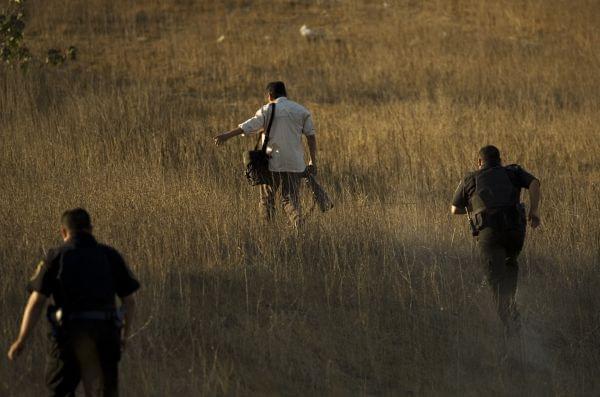ENCORE: Protecting Journalists Around The World; Author Kwame Anthony Appiah

Police officers run after a photographer trying to reach a better view of a crime scene where a police officer was killed in Rosarito, Mexico, Thursday, Oct. 23, 2008. Guillermo Arias/AP
Last year, 54 journalists were killed while doing their jobs. Hundreds more are in jail. And press freedom is being threatened, even in democracies. We’ll speak with the director of the Committee To Protect Journalists, Joel Simon. Plus, whether it’s color, class, creed or ideology, a lot goes into how we form our identities. But what’s the difference between identity and a label? We’re revisiting our conversation with author Kwame Anthony Appiah.
Every year, hundreds of journalists around the world are attacked, imprisoned, kidnapped or killed. If you even think back on the past year, many names come to mind, like Jamal Khashoggi, who was murdered at the Saudi embassy in Turkey, or the Capital Gazette in Maryland, where five employees were shot and killed last summer.
The Committee To Protect Journalists tracks all of these cases. It's a nonprofit dedicated to not just defending the work of journalists, but also press freedom all over the world.
As the executive director of this organization, Joel Simon knows these stories well. We caught up with him last year, when he was in the Midwest doing a visiting residency at Beloit College.
"The vast majority of journalists killed around the world are local," explains @Joelcpj @pressfreedom.
— The 21st (@21stShow) July 31, 2019
They're not big named Western reporters like Daniel Pearl.
"This kind of repressive action has tremendous impact on... what we know."#FreePress
Plus--
What’s the difference between an identity and a label? Whether it’s how we express our faith, what country we claim as our home, how we look, or what gender we are, these are part of our identities. But are they just labels? And who really is the other when it comes to humanity?
Those are the big questions Kwame Anthony Appiah grapples with in his latest book, The Lies that Bind: Rethinking Identity. And by breaking down color, class, creed, and our national identity - in this case, country - this is a book about how many of the ways in which we think about our identities are wrong, or at best, misleading.
We spoke with him during the Chicago Humanities Festival last year, in front of a live audience at the University of Chicago.
"We are as tribal about our political identities as we are about anything... more than we are about our religious identities."
— The 21st (@21stShow) July 31, 2019
- @KAnthonyAppiah

